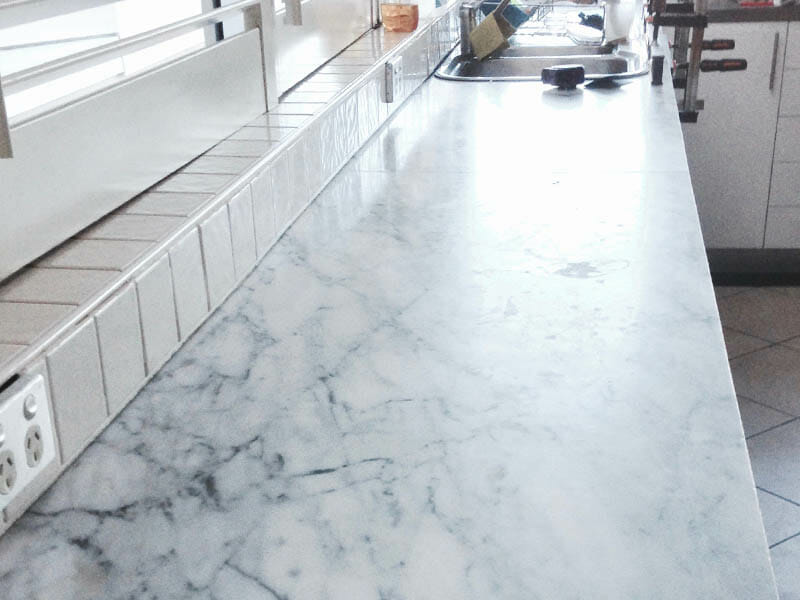
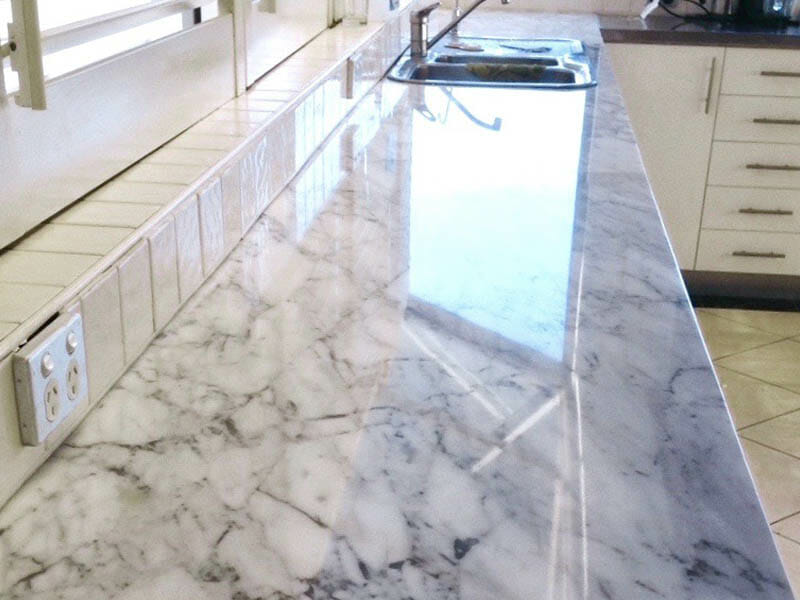
Is stone benchtop polishing or honing long overdue in your kitchen or bathroom?
The Marble Man specialises in professional stone benchtop polishing and honing. Our processes developed over many years, together with our experience and quality equipment, allow us to achieve outstanding results on both natural and engineered stones.
Natural Marbles
Marble, limestone, travertine, onyx and some quartzites are classified as soft stones, and are susceptible to staining and etching. Oils and liquids, can penetrate the stone causing staining, and acidic foods and liquids can etch. Utensils, abrasive cleaners, scourers and knives used without cutting boards, can scratch and cause dull spots.
Natural Granite
Granite is a harder stone than marble. It is not prone to etching or scratching like natural marbles, but can still stain over time. Oily products, especially in the kitchen and bathroom can penetrate the service over time and cause unsightly and hard to remove stains.
Granite is traditionally difficult to polish due to its hardness, however The Marble Man has developed a unique process over many years to overcome this challenge. We call this process Fusion Plus Polish. Results will depend on the age of the stone and damage.
Engineered Stones
Caesarstone, Essastone, Quantum Quartz, Silestone, Smartstone and HanStone are made from a mix of granite and resin. Hardness is similar to granite but these stones can still sustain burn marks from hot pots being left on the surface too long, scratches from items being dragged over the surface and cuts from knives not being used without a cutting board. The Marble Man has developed a process for restoring engineered stone called Fusion Polish.
EMAIL OR CALL US NOW! 1300 627 626
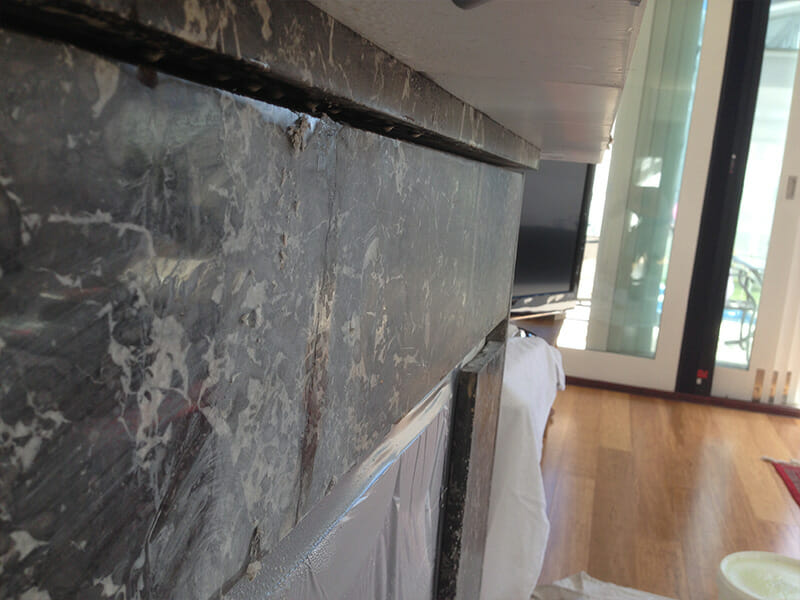
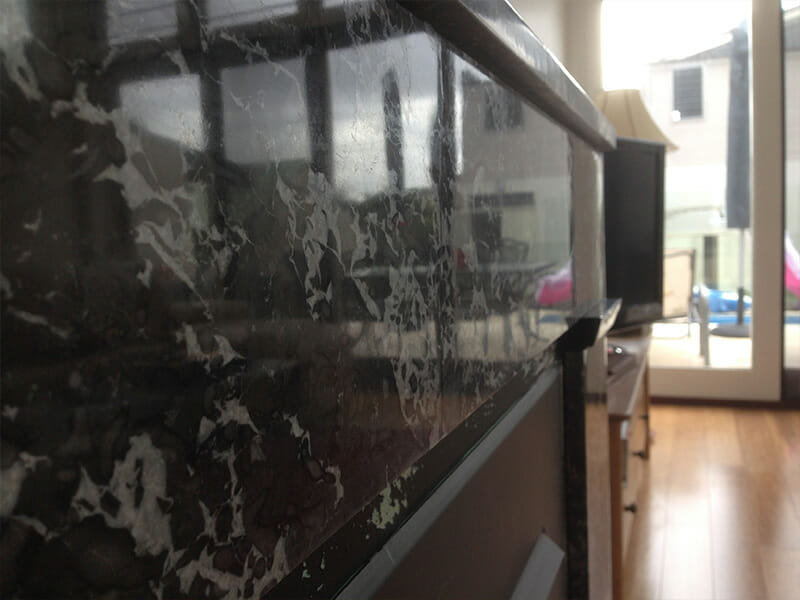
Are you familiar with our stone benchtop polishing and honing process?
The Marble Man has developed effective stone benchtop polishing and honing processes to successfully restore the full gloss finish to natural marble and stone surfaces and the factory finish to engineered stones.
Step 1:
Areas surrounding the benchtop, vanity, bartop or furniture are covered with plastic or tape to protect them from dust and slurry created during the polishing process.
Furniture nearby is removed if pre-arranged.
Step 2:
Several grades of diamond abrasives and a hand held polisher are used to wet grind the surface of the stone benchtop to remove dull, worn, scratched and stained areas.
A special diamond abrasive polishing compound is then used to achieve, either a smooth, uniform and highly reflective finish, or a satiny semi-gloss or a honed finish.
Step 3:
A wet vacuum cleaner is used to remove excess slurry and dust around the benchtops and surrounding areas.
Once the surfaces are clean and dry the protective barriers and tape are carefully removed so the area is left tidy and free from any trace of polishing.
Step 4:
Where possible our technicians will provide advice on the safest, most effective products to use to protect and clean your stone benchtop.
In most cases sealing will be recommended to protect the stone from staining after polishing.
The application of a protective film called Tuffskin, especially designed to protect natural marble, limestone, travertine and onyx benchtops from etching, staining and scratching, may also be recommended.
EMAIL OR CALL US NOW! 1300 627 626
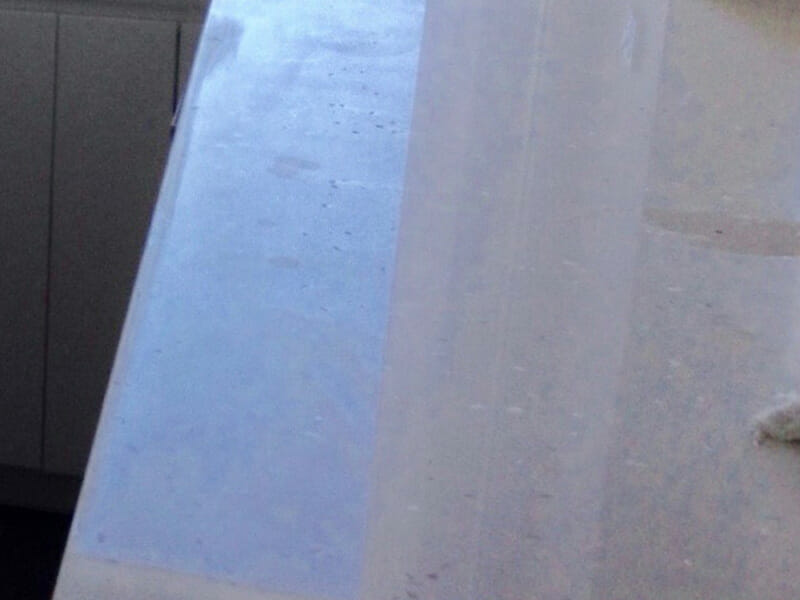
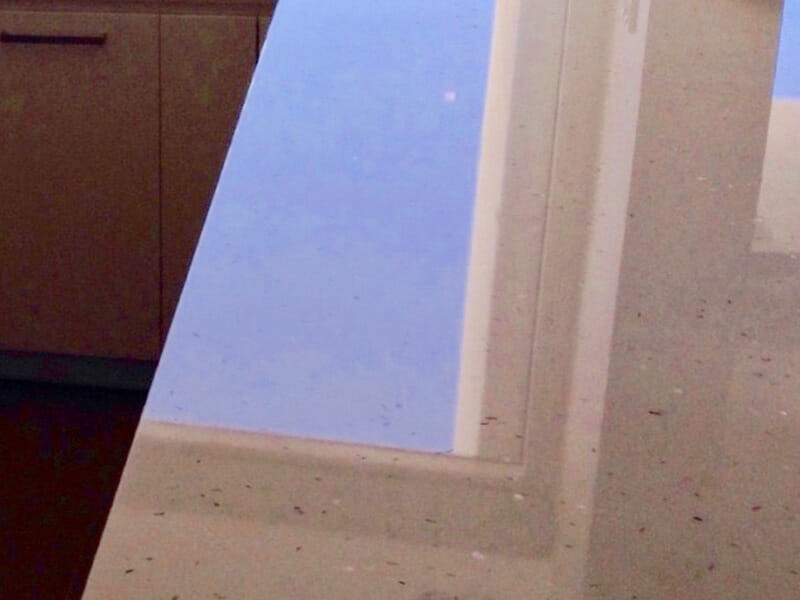
Did you know stone benchtop polishing and honing has many benefits?
The benefits of professional stone benchtop polishing by The Marble Man are numerous, because we understand stone and are experts in our field.
We have spent many years developing and testing stone benchtop polishing processes to restore numerous different types of natural stones such as marble, limestone, travertine, onyx and engineered stones such as Caesarstone, Essastone, Quantum Quartz, Silestone, Smartstone and HanStone.
- Marble and stone benchtop polishing will remove scratches, dull spots, etch marks, discolouration and stains
- High gloss marble and onyx kitchen benchtops and bathroom vanities will once again look highly reflective after polishing
- Honed marble, limestone, travertine and onyx kitchen benchtops and bathroom vanities will look clean and feel smooth after honing
- Semi-gloss marble, limestone, travertine and onyx kitchen benchtops and bathroom vanities will look clean and stain free after polishing
- Engineered stone kitchen benchtops and bathroom vanities will regain their smooth factory finish after a special fusion polish
- The ambience of your kitchen or bathroom will be improved
- Regular maintenance of your kitchen benchtop and bathroom vanity will be easier
- Professional restoration will ensure that the stone is not damaged further and that surrounding areas will be adequately protected during the polishing process
- Our Technicians will advise on the right products to use for maintaining your stone benchtop or vanity after it is polished
- We can recommend and supply professional grade cleaning products to keep your natural or engineered stone benchtops and vanities looking and feeling like new
EMAIL OR CALL US NOW! 1300 627 626
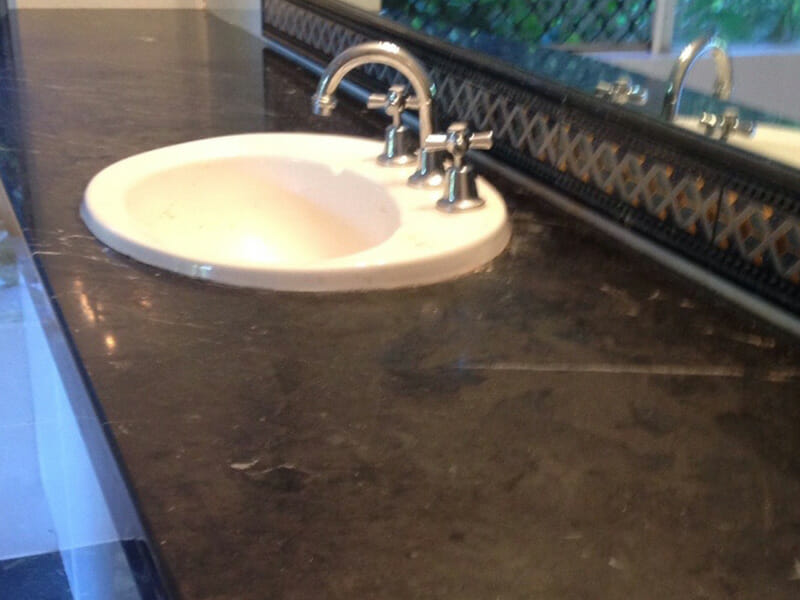
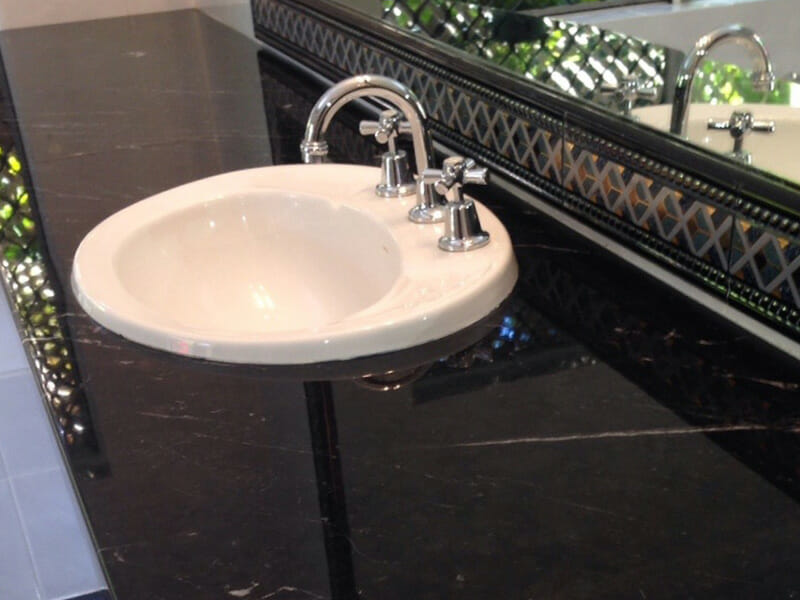
Do you know which products to use after stone benchtop polishing or honing?
After polishing or honing, it is essential that the correct PH balanced cleaning products are used to maintain the newly restored natural or engineered stone benchtop or vanity.
The Marble Man recommends REJUVENATA to maintain a smooth feel and streak free shine. Visit the Stone Cleaning Products section to read about REJUVENATA and download the product information brochure. If you are unsure which products to use on your marble or engineered stone surfaces contact us.
Cleaning Tips
Avoid abrasive or acidic cleaners as these will damage the stone. Bleach, cream cleansers, vinegar and citrus based products, often sold in supermarkets, are not ideal cleaning options. Natural granite or engineered Caesarstone, Essastone, Quantum Quartz, Silestone and HanStone are not as susceptible to etching but can still scratch and stain.
Wipe up spills immediately and limit exposure to the following:
- Acidic substances that etch: Fruit juice; lemons; milk; wine; citrus based cleaners; vinegar; tomato sauce; mouthwash; toothpaste
- Substances that discolour and stain: Coffee; tea; beetroot; cooking oils; perfumes; make-up; hair dyes; soaps; tanning solutions; bleach
- Abrasive cleaners that scratch and cause swirl marks: Crème cleaners; green scourers; steel wool pads (The only safe scourer to use on stone is a white scourer called a SCRUB A DUB)
- Caustic substances that strip and leave white spots: Acid from batteries; Draino
- Solvents that strip protective sealer: Methylated spirits; nail polish remover
Sealing
After professional cleaning, polishing or honing, it is recommended that the stone be sealed to protect it from staining.
EMAIL OR CALL US NOW! 1300 627 626
MASTER BUILDERS QLD MEMBER

HIA QLD MEMBER

TUFFSKIN APPROVED APPLICATOR

AQUAMIX APPROVED APPLICATOR

DRYTREAT APPROVED APPLICATOR


